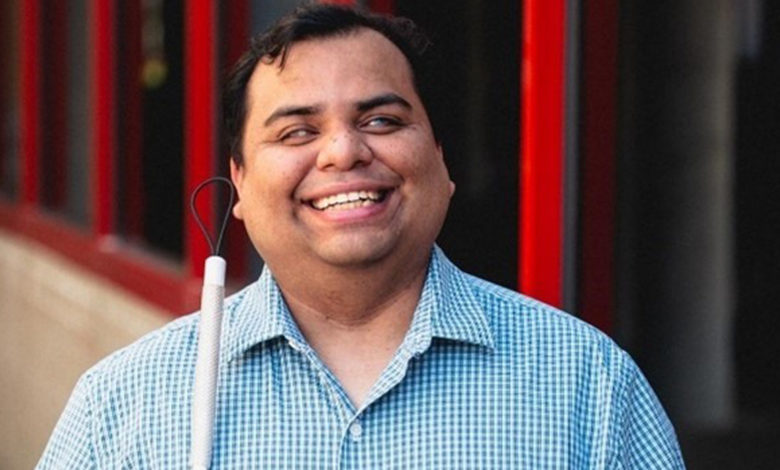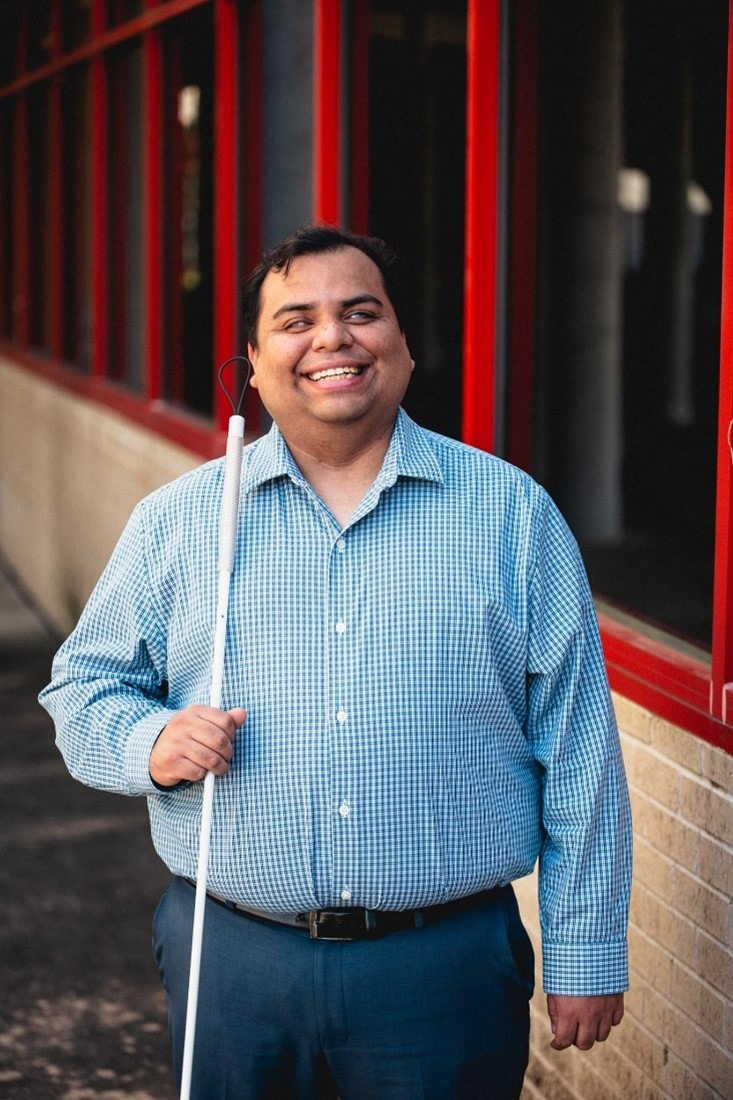
Transportation Equity Gets Personal
Gabe Cazares spearheads new solutions to Houston’s mobility woes.

For many residents of Houston and Harris County, getting from point A to point B can be frustratingly complex. That’s something the transportation-justice nonprofit LINK Houston aims to correct. The organization’s goal is to make navigating Houston without a car equitable and inclusive for all—a task that executive director Gabe Cazares, a blind and queer Latino, is more than ready to tackle.
Cazares was born and raised in West Houston’s Spring Branch area and got his start in nonprofit activism by working with civil-rights organizations. He has notably served as Houston’s director of the Mayor’s Office for People with Disabilities, as well as the government-affairs manager at the National Federation of the Blind in Baltimore, Maryland.
Recently appointed to his LINK Houston position, Cazares is especially passionate about transportation equity for the LGBTQ, disabled, and people of color populations.
“Many of us don’t drive, and rely on public transportation and multimodal transportation to be able to participate fully in our communities. That is what led me to this role.”
For decades, Houston and Harris County prioritized moving as many private vehicles as possible over great distances. “That means more lanes, wider streets, faster speeds for vehicles,” Cazares explains. “That has resulted in a lot of injury and death on our roadways.”
He emphasizes that these car crashes are not “accidents” at all, because “accidents presume that nothing could have been done to [prevent them]. That’s not accurate.”
The mounting fatalities and traffic congestion have necessitated a change in the built environment for vehicular traffic, and that is where Cazares’ advocacy work in Mayor Turner’s office, and now with LINK Houston, comes into play.
“We’re seeing the City and the County invest in pedestrian walkways, bridges, and bike facilities—including protected bike lanes—more than ever before,” Cazares says. “That’s because if we’re going to be a city of the future, it’s going to be critical that people have other [options beyond requiring every person to] own a vehicle.”
Some of the mobility improvements Houstonians are already seeing include the design and implementation of rapid-transit routes for Metro bus lines. LINK Houston steps in during the design phase to ensure plans like this are fully equitable and serve the needs of historically excluded communities such as Gulfton, Magnolia Park, the Second Ward, and Kashmere Gardens.
“We ‘co-power’ with communities so that they can harness their own power. We provide them with the tools and the knowledge to successfully advocate for transit investments in their community,” Cazares explains. “[For example], Metro’s Gulfton Circulator was done because of LINK Houston supporting community advocates on the ground.”
He also notes that the effects of LINK Houston’s work are felt beyond the city’s bus and rail corridors. “There’s an undeniable correlation between transportation equity, affordable housing, and environmental justice,” states Cazares. This means that LINK Houston will push policymakers to ensure that affordable housing is built near equitable, multimodal transportation options.
Additionally, LINK Houston is spearheading other initiatives in several Houston neighborhoods.
“Areas of Montrose have broken or no sidewalks, making it impossible for older adults, young families, parents who use strollers, or people with disabilities [who require] mobility devices to safely navigate in the community,” says Cazares. “So we’re going to be making sure that as the City redesigns and rebuilds Montrose, those pedestrian amenities are built.”
Additionally, LINK is paying attention to what is happening in the downtown area with the Complete Streets initiative that has transformed Bagby Street. Downtown residents are also being encouraged to take advantage of the completed multimodal transportation options throughout the area.
And the mobility needs within the LGBTQ community is also a LINK priority. “We are part of the LGBTQ community ecosystem because transportation impacts all of us,” says Cazares.
The fact that he is a disabled member of the LGBTQ community brings additional meaning to his work. “I think society tends to have a negative view of people with disabilities, and I’m just grateful that, through my lived experience, I’m able to offer a different perspective that a lot of people don’t see,” he says.
And when it comes to LGBTQ venues, he points to the effects of ableism in the community. “We still have a lot of work to do so that LGBTQ people with disabilities can participate in our spaces, fully and inclusively,” Cazares adds. “I look forward to continuing my work so that LGBTQ people with disabilities can show up and benefit from what our community has to offer.”
For more on LINK Houston, visit linkhouston.org.











Comments